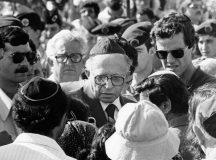Jonah Naghi is the Chair of Israel Policy Forum’s IPF Atid Steering Committee in the city of Boston. A frequent commentator on the Israeli-Palestinian conflict and Middle Eastern affairs, Jonah has spent extensive time in the region and received his Masters in Social Work at Boston College (2020) and LCSW (2021). All the views expressed are his own.
Since the conclusion of the most recent Israeli elections, I have been one of many supporters of Israel who are concerned about what it might mean for the Jewish state. With the consensus among Israel’s right-wing coalition being to restrict the power of the supreme court and disciples of anti-Arab figure Meir Kahane, such as Itamar Ben Gvir, finding themselves in high-ranking positions in the government, many like myself are concerned that it may lead to the erosion of Israeli democracy and further reduce the already slim chances of a peaceful solution with the Palestinians.
A common counterargument is that people like Ben Gvir may moderate their positions once they find themselves in these high-ranking positions. Some examples commonly given are people like Ariel Sharon and Menachem Begin, who were both once considered extremists, but then moderated their positions when they became prime minister.
Sharon – once a champion of the settlements – disengaged from the Gaza Strip and dismantled four settlements in Judea and Samaria (West Bank) when he became prime minister. Menachem Begin – who was once Britain’s most wanted terrorist – gave up the Sinai Peninsula and made peace with Egypt when he became prime minister.
Indeed, there has been a pattern of Israeli figures who started out as extremists, but then moderated their stances and made concessions when they found themselves in higher positions of power. Sharon once referenced Israeli songwriter Yankele Rotblit to explain his shift in views when he became prime minister: ‘What you see from here, you don’t see from there.’
With these thoughts in mind, I decided to read Daniel Gordis’s biography of Begin, Menachem Begin: The Battle for Israel’s Soul (2014), to both assess how he may compare with people like Ben Gvir and whether critics are correct in suggesting today’s right-wing has become untethered from its roots.
At first glance, there are some parallels between Ben Gvir and Begin in both their actions and how others perceived them. Ben Gvir is notorious for his lionisation of Baruch Goldstein, a Jewish settler terrorist who murdered 29 Palestinians in 1994 while they were trying to recite their prayers. Ben Gvir has also been charged multiple times for inciting violence against Arabs and was, in fact, rejected from serving in the Israeli military because he was considered too extreme.
Begin similarly participated in several acts of violence during Israel’s War of Independence while leader of the Irgun that many considered to be acts of terrorism, such as the bombing of the King David Hotel and the Deir Yassin massacre, though Gordis points out that the facts concerning Deir Yassin remain heavily disputed.
Begin was also considered an extremist and rejected by many both within and outside of Israel. Israel’s first prime minister, David Ben-Gurion, portrayed Begin as a pariah and a danger to the newly formed Jewish state (he compared him to Adolf Hitler, in fact). Additionally, just as the Jewish diaspora is raising concerns over the rise of Ben Gvir today, many within the Jewish diaspora were expressing similar sentiments about Begin after Israel’s independence. For instance, when Begin was planning to visit the United States after Israel won its independence, two dozen prominent American Jewish figures wrote a letter to the New York Times condemning Begin and accusing him of terrorism in the incident at Deir Yassin.
On the surface, then, there are some similarities between Begin, Ben Gvir, and many others within the right-wing camp in Israel today that may be traced to when Begin and his Herut party – which would come to be known as today’s Likud party – rose to power.
Some may find the ideas and actions of right-wing Israelis in the past and present problematic, but Gordis explains why Begin and the ideology of the right-wing camp in Israel then and now may not be as black and white as they seem.
Gordis first helps us understand and empathise with why Begin saw things the way he did. Growing up, Begin not only preserved his Jewish rituals and practices, such as speaking Hebrew and Yiddish and keeping the Sabbath, but also boasted about his Jewish pride in the face of antisemitism in the Polish town of Brisk. Indeed, Begin and his family were resilient while at the front lines of rising antisemitism in Europe in the early 20th century, which then culminated with Begin’s parents and oldest brother being murdered by the Nazis. Begin also lived in Israel when it was invaded multiple times by the neighbouring Arab states before it established itself as the strongest country in the region.
After losing his family during the Holocaust and then needing to fight for his survival in Israel, Begin was, according to Gordis, conditioned to believe that the entire world was against him and the Jewish people, and that the only way they could survive was to be strong. This is, of course, a common story for many Jews who immigrated to and lived in Israel, which may help us understand why many Israelis are right-wing.
Nevertheless, Begin also showed that being right-wing does not necessarily make you a ‘racist.’ Despite being far to the right and believing in Jewish particularism, Begin also upheld universalist values and dedicated much of his political career to helping various marginalised communities. For instance, he ordered the rescue of Ethiopian Jews and became the first to champion the Mizrahi community that had been so neglected in Israel when he became prime minister. Begin even assisted non-Jewish communities, such as advocating, from the opposition, to end martial law for Israel’s Arab citizens in 1966 and providing Vietnamese refugees a haven in Israel under his premiership.
Indeed, Begin’s story helps us not only understand why many Israelis like himself were and still are right-wing, but also shows how one can be passionate about Jewish particularism while upholding universalist values.
Yet, at the same time, Begin’s decisions and values may also reveal the problem within the right-wing camp in Israel today and why people like Ben Gvir may not change like he did.
What made Begin open to change was a firm commitment to certain democratic values. Begin respected the rule of law and the independence of state institutions, even if it sometimes meant not getting his way. ‘There are judges in Jerusalem’, he once famously said. A good example Gordis references is how Begin responded to the supreme court’s rulings over settlements. Even though he ideologically supported the building of Jewish settlements in Judea and Samaria (West Bank), Begin respected the supreme court’s ruling in July 1979 that the Israeli settlement of Elon Moreh was built illegally on Palestinian land and agreed, with a heavy heart, to transfer it.
Begin also believed that all the votes in the Knesset, even those he most vehemently disagreed with, such as the Arab parties, counted just as much as his did, such as when he acknowledged that the Arab members of the Knesset had the right to vote on whether Israel would accept German reparations, even though he implored them not to.
Unfortunately, however, these democratic values seem to be lacking within the right-wing camp in Israel today. Many right-wing ministers in Israel are making it a priority to curtail the powers of the supreme court and other state institutions. Some of them have even suggested that the votes of the Arab parties do not count, and Ben Gvir is advocating to expel Arabs from Israel who are not considered ‘loyal’ to the state. These are all anti-democratic policies and ideas, and as such are neither ‘right-wing’ nor ‘left-wing’.
In conclusion, the problem with the current Israeli government and officials like Itamar Ben Gvir is not necessarily that they are right-wing or even ‘far’ right-wing, but rather that they do not uphold certain democratic values that previous right-wing Israelis like Menachem Begin did. And lacking these democratic values is also why officials like Ben Gvir are less likely to change. By not respecting the rule of law or believing all votes count equally, people like Ben Gvir are less likely to be open to listening to others and to potentially changing. This is the source of the problem within the right-wing camp in Israel today and this is what will need to change to save the democracy and soul of the Jewish state.





































